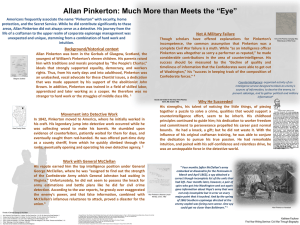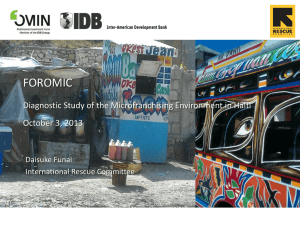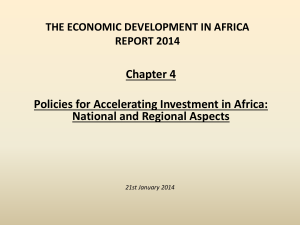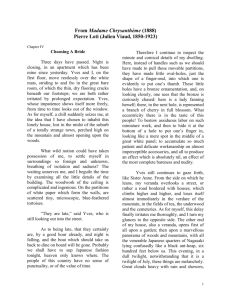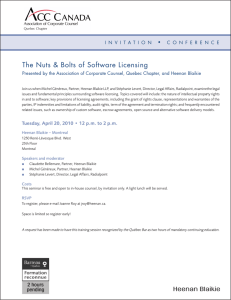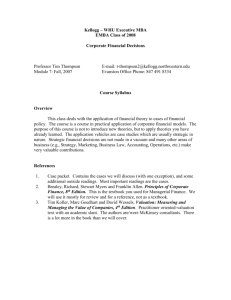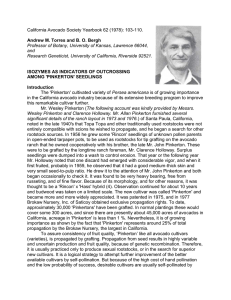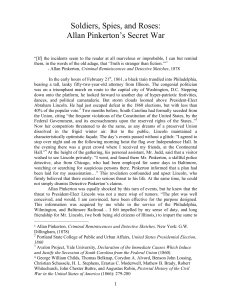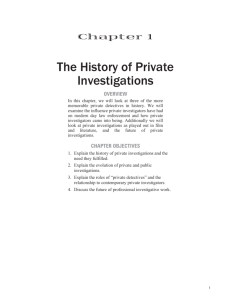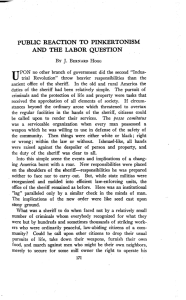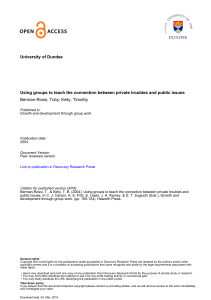Re-engaging community development in social work
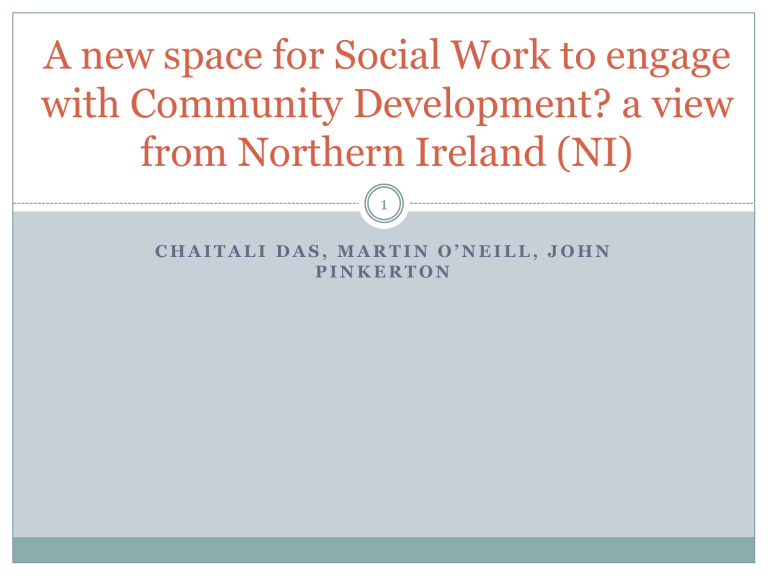
A new space for Social Work to engage with Community Development? a view from Northern Ireland (NI)
1
C H A I T A L I D A S , M A R T I N O ’ N E I L L , J O H N
P I N K E R T O N
Outline
2
Community Development and Social Work
History of Community Development in the UK
Community Development in a socio-political context: NI as a case study
Current Community Development in NI
New Contested Spaces
How and what can/does social work bring to
Community Development?
Some questions to consider
Community development and Social Work
3
Key method in social work practice
Underpinning assumptions: Social justice, HR, equality, empowerment, political
Social Work history, nonetheless, fraught between the impulse to work with the individual and to work with communities (Jane Addams and Mary
Richmond)
History of Community Development and Social
Work in the UK
4
Community development recognised as a method of social work in 1959 through the Young Husband Report (Popple 1995)
Expansion of health and social care services in 60s and 70s to address issues of poverty, influenced by Marxist and New Left ideas (Alinsky 1969, Friere 1973, Bailey and Brake 1980, Corgan and Leonard)
Barclay Report, 1982: Community Social Work
Community Development Project in 1977 criticises Government policy on structural interpretation of Poverty
1980s and 1990s sees marginalisation of community development and community social work under Conservative governments
Community Development in a socio-political context: NI as a case study
5
While Community Development in NI stretches back to 19 th
Century, NI’s socio-cultural context of the troubles shapes social workers role
The troubles sees high need and brings social workers and community workers together but laid with tensions.
During the troubles (1960 – 1990s), while community development flourished in other parts of the UK, social work in NI adopts a non sectarian approach to reach clients and protect themselves
(Campbell 2007; Houston 2008, Kilmurray 2011).
Community development relegated to councils and separated from integrated health and social services
Depoliticisation of social work and withdrawal from community organisation/development.
Community development becomes peripheral within social work practice. Mistrust of social workers in the community.
Community development becomes ‘commissioning’
Current Community Development in NI
6
Community development is largely the domain of the community sector
While community development as led by the community sectors has made significant strides, the socio-political context of NI remains largely segregated and divided.
The community sector remains fragmented and un-coordinated (O’Brien
2007)
Furthermore, community sectors are squeezed/controlled by funding requirements to meet agendas of larger public sector funders or philanthropic organisations (in terms of area of work, funding requirement, bureaucratic processes, evaluations: RCT)
Community sectors have become vehicles of public services with little scope for community action and advocacy (Morrissey 2012)
Community sectors responding to commissioning and provision of services in the community rather than advocacy/development:
Neo-liberal policies (austerity), market policies (competitive, contract culture), evidence based and individual centred agenda
New contested spaces?
7
Socio-economic and political changes are perhaps creating a new spaces in which social workers will operate
Emphasis on community development remains an important area of work and has been outlined a variety of legal and policy documents (HSCB
2011, DHSS 1998, Children’s order 1986)
Austerity, frustration and the impact of neo-liberal policies
Globalisation (community development, welfare and other countries,
Social Development) Merging of global issues and ideas (Global Agenda-
IFSW 2012)
Political agendas and discourses (state neglect?)
Public involvement initiatives, service user involvement, personal budgets, minority communities, children’s rights (from Pinkerton and
Campbel)
Call for politicisation (problematising of AOP and the mandate for social work) (Humphries 2004, Jordan)
If social work is to remain relevant, it should support community development from within and outside the profession (Dixon and Hoatson
1999, Ferguson and Lavalette 2006)
How/can we engage in community development
8
What do social workers bring to the table?: we need and should but can we…
Social work practice in NI is currently
shaped by statutory services that are regimented, residual and reactive
(Heenan 2004) emphasis on technocratic functions and professionalisation has detached social workers from the community (Pinkerton 1998, Campbell and
Pinkerton 1997)
Emphasis on standardisation in training, corporatisation do not fit with community development dynamics
Failed to address anti-sectarianism/gain trust in community
Lack of training to do community development (Dixon and Hoatson 1999,
Heenan 2004)
Community development and anti-sectarian is messy, political stuff
Hope?
9
The need for alliances for all: political action and engagement
Build meaningful partnerships and rethink the hierarchical power relations we occupy (Healy 2000)
Critically rethinking and strategising how we represent ourselves re statutory and regulatory functions
Social work education and training
Prioritise community development approaches
Reconsidering our purpose and possibilities in light of changing contexts
Some good practice possibilities
The new spaces…
Some questions to consider
10
Similarities or differences in social workers relationship with community development in other places?
How can social workers engage with community development?
Possibilities and risks of social work engagement in community development work?
Challenges in Community development work?





